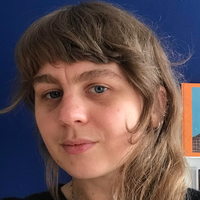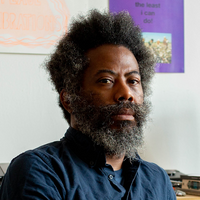On finding ways to keep going
Prelude
Kerry St. Laurent is a visual artist from Western Massachusetts. Her mixed-media work references nature, mapping, microbiology, architecture and memory, deconstructing the subjective lens and presenting impermanence as the grand unifier. Her work has been exhibited locally and nationally and she has served as Artist-in-Residence at Hot Springs and Isle Royale National Parks. She teaches drawing, color theory, and design at Western New England University.
Conversation
On finding ways to keep going
Visual artist Kerry St. Laurent discusses managing a chaotic creative process, working outside the gallery system, the unpredictability of social media success, and not being afraid to make imperfect work.
As told to Elle Nash, 3080 words.
Tags: Art, Education, Collaboration, Mental health, Process, Beginnings.
You said you were more productive during COVID. Can you talk a little bit about what that was like for you?
It was really the Negative Space project, my set of pieces based on the novel by B.R. Yeager, that kicked off a really productive art phase for me. I was getting back into it in 2019 after just a rough personal time and also I was getting my doctorate and I was just not making much art for several years. A little here and there, but it was nothing too noteworthy. And then in 2019, I pulled together my mental health and wanted to make more art again. Ironically, I also need to make art to be mentally healthy.
By the time COVID hit, I was welcoming the ability to say no to everybody to not do anything. I just had time in the studio. I think that doing collaborations made me accountable. I will be a little bit more productive if I know there’s an end goal. Somebody else is not even necessarily relying on it because if I had bailed on something, it wouldn’t have been the end of the world, but it was just creating that accountability for myself.
You originally studied painting. You were saying you’d bought and first started using alcohol inks in 2019. What was that shift in process like for you?
If you trace my art back to undergrad I would say that moving paint has always been a really big part of what I do. I lived in a van for a while on purpose, so I was doing ink drawings because I just didn’t have the space to spread out to do things with moving paint. I would say the consistency through my work throughout my painting career has been some form of chaos mixed with some form of a really meticulous work.
I loved the forms I was getting, but something that was really frustrating me with that process for a while was everything was coming up so pretty. I do make pretty work. But because I was using watercolor, which is a translucent medium, and I was working on white paper, it often created these candy pastel colors and I’m not really a candy pastel person. I kept trying to get richer and darker. I was so dying to make grungier, heavier, deeper work. I had tried layering stuff before, it just didn’t work. So alcohol ink was just a solution to basically continue that style.
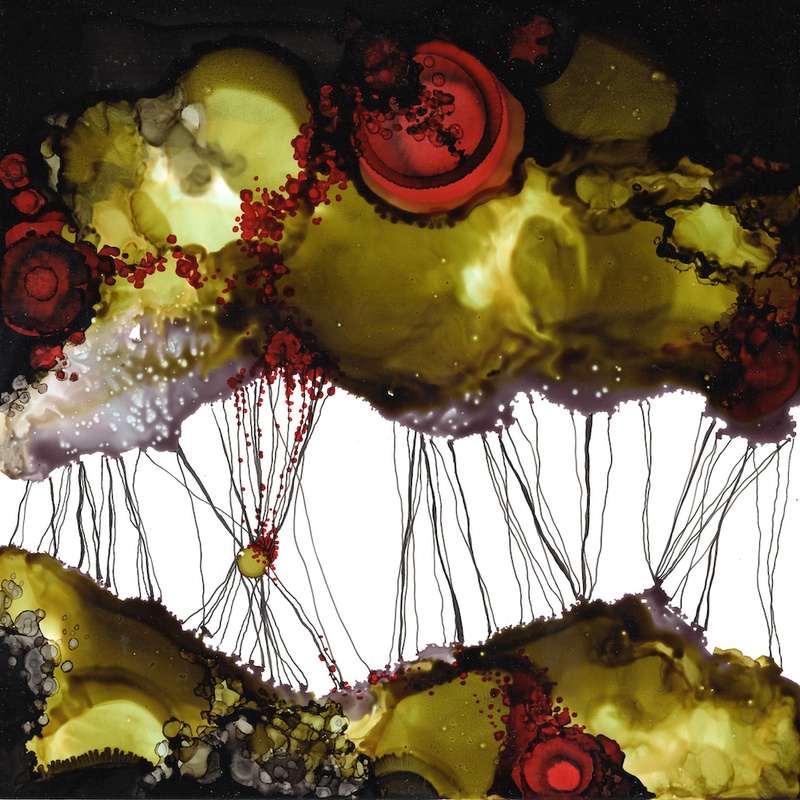
Something Wants Us Gone
On the note of collaboration, you seem to love creating work based off of writing. Can you talk a little bit about your desire to do this? What is that process?
If you look at my ink drawings, I created a specific iconography of how I interact with my spiritual self, my physical self, the world around me. It was trees, maps, cathedral windows, and microbiology. Part of it is that I’ve already said so much about myself. I want to express how I feel about what someone else is saying. I think that’s part of what’s drawing me to collaborations lately. You have so many interesting things to say, how could I express that through my lens?
I completely inserted myself into the Negative Space project. I was close enough friends with Adam (aka Burial Grid), that I knew he was working on this score for his friend, B.R. Yeager. I said to him, “You’re doing an audio piece based on a book that’s not released? That’s so cool. Would you be open to me talking to Yeager and doing a visual component?”
That just lit a fire because I read Negative Space literally in two sittings. Then I put on my noise canceling headphones and just listened to the score several times. At one point, I remember I was in such a zone, making those ink pieces that my face felt numb. I was just completely in a different place. I had a few drafts where I was being a little more literal. And then when I hit my stride they poured out of me like an alien being, which every artist knows that feeling, it’s like something is escaping through you. You don’t even understand it. Sometimes the process is like that. It’s just very responsive, I have some types of synesthesia, I can associate certain people with certain colors or certain sensations, sometimes I’ll hear something and I’ll just picture it and then I’ll try to create it.
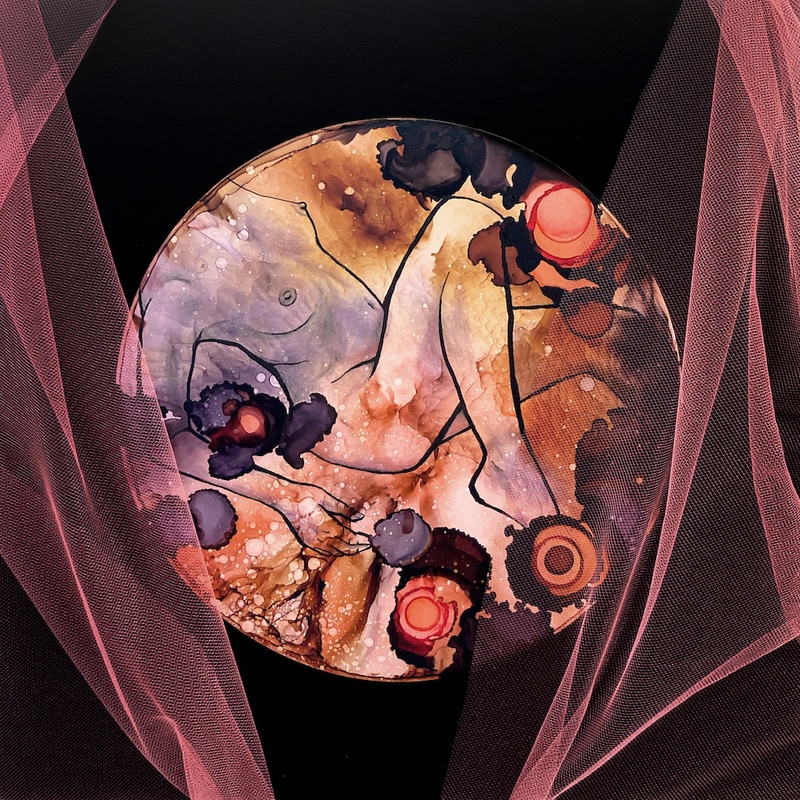
Balthus
With the Nudes series that we did together [editor’s note: based on interviewer Elle Nash’s short story collection, Nudes], there’s a little bit more of an intellectual approach. I hadn’t read the whole book, just the one title story. I was really intrigued by your motivations, but I didn’t want to ask you. So I was asking myself, “Okay, what’s my interpretation of this?” What is this story saying about reclaiming the body and the self and what does this mean about being a woman, too, and how we move through the world and how we express ourselves and how we adjust to expectations? That process had several iterations. It was talking about a color palette and thinking about how it might represent flesh and all different flesh tones and then thinking about how it also represented violence. So bruisy, very specific colors. It wasn’t like I read this story and decided, “These are the colors.” It was more of a thought process of where I was headed.
The series I’m working on now for Maggie Siebert and her story collection Bonding, they’re what I call “when you know, you know” illustrations. If you’ve read the book, you could probably easily pick it out and think, “Oh yeah, that’s definitely this story.” But if you just look at the pieces, it’s not giving anything away, it’s not actually telling the story. It’s very different project to project. There are common threads in an artist’s style, but I don’t know any artist where that’s the goal. I don’t think I know any artist who’s just like, “Yeah, I just want to recreate the same thing over and over slightly differently.”
I think when you’re in the midst of creating you’re not thinking about your voice or your style. You’re making it because you want to make it, you’re driven by pure desire to make the thing.
I always tell my students if I could leave them with one thing this semester it’s to make a lot of crap, just let go and make a lot of crap because in that process, they’re going to make great stuff, too. But if you’re so hung up on the thing you’re making and what it means and what the end game is and how people are going to receive it, then you’re not going to reach that point where you’re just actively creating.
That’s actually advice I’ve heard too from my writing teachers: “Yeah, you have to write a lot of bad before you get any of the good and it just will happen.” Have you ever gone through that process of overthinking something and how do you get out of that?
I’m an overthinker in life. My closest friends would attest, the way that I get out of it is to completely spin out. Which means that, in the creative process, that might translate to frenzy. I reached that point in the Nudes series, where I hit a frenzied wall and was redoing this one drawing, at least seven times.
I just hated it. I had to see it to the end until I was able to set aside this pile of drawings because I’d taken them as far as they would go, then start with a clean slate. Sometimes it’s hard for me to reset in real time. I’ll completely spin out and people around me just know, “Oh, there she goes. Just let her go. She’ll get to the end eventually.”
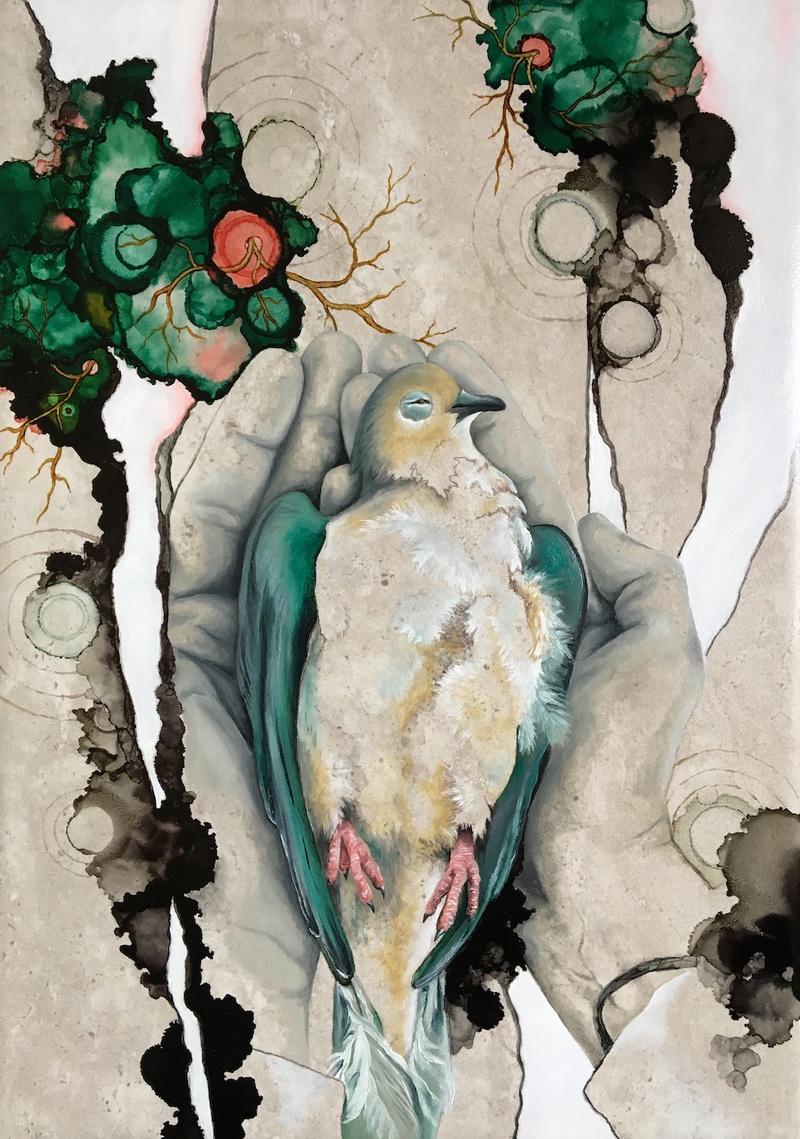
I’m Not Leaving You Here
We’ve talked in the past, too, about the pitfalls of trying to be a part of the gallery circuit as an artist. It sounds like that’s connected to donating the proceeds of the sales of your work. Can you speak to that?
Donating my profits of course benefits a good cause, but also helps me detach my definitions of self worth and success from my sales. It opens me up to a more authentic creative freedom. It’s the same as the publishing community, and it’s the same as the music label community. There are the same types of traps and the same types of popularity contests and the same types of things that are ultra consumable that define popularity and actually being able to make money. I’ve never been drawn to the gallery scene. Obviously as an artist, I’ve dabbled in it plenty, but I haven’t put a lot of effort into it because it’s so much rejection.
I’m pushing 40. I’ve been doing this for a long time and it’s not that I can’t handle rejection. I just don’t want to. I don’t want to send out my work and for art, a lot of it’s juried shows, which means you’re paying $30 to get rejected. I don’t want to spend money to get rejected. It doesn’t mean anything about my work. It’s the same thing about writing. It’s not about you 99% of the time. It’s not about you or your work. It’s about the show It’s about the juror. It’s about the whatever.
I got tired of that. You have to have not just a thick skin, you also have to have a little bit of an ego edge in the art world to go into it because that’s the model. Then there’s, of course, the luck. I’m not saying that every famous artist is an egotistical asshole. There are plenty of lovely people that have well-deserved fame and are doing amazing work. I definitely try to focus on those artists for my students, but some of it’s just who you’re connected to and who discovered your work and how you were raised and your drive to actually try to get into the gallery scene.
I joined a local co-op gallery. I’m sure there’s a literary equivalent of somebody opening up a small press with some people that they know and saying, “Let’s just make stuff and put it out there.” I was ready to give up showing my work in a physical space completely. But part of me likes that, especially after I did the Nudes series, because that series has these really beautiful tulle overlays. They did photograph pretty well, but in person they’re really striking and I feel sad that nobody’s seen them, and that motivated me to find a way to be able to stand in a space once in a while with my work on the walls. I’m working with metallics now too, and you just can’t see all of it digitally.
When did you know that you wanted to teach art to others?
Very, very early on. It was probably high school. I come from a long line of teachers and I went into college thinking I was going to be an art education major to teach high school. Then I got to college and realized I don’t want to teach high school, I want to teach college because I’m actually not really into discipline at all. If you want to go outside and smoke a cigarette, fine. If you want to go to the bathroom, fine. I hate the idea that people have to ask me to do basic things that they want to do.
In undergrad, I realized that you don’t get a degree in art education to teach at the college level. You get an MFA, which means you get a degree in whatever you want to teach. I went right into an MFA program and then about halfway through my MFA program, it was revealed to me that it wasn’t the same as if you wanted to teach in high school, where you would get your degree, you get your certification, you’d apply for jobs.
My professors basically told me, “Oh, you’re going to get your MFA and then there’s going to be about 500 applicants per position. And you also live in New England and want to stay here, which is really a hotspot of where people want to live and work. So basically you’re not going to be able to find a job.” And now I’m thinking, “I just got a fricking degree in painting and I’m halfway to a second degree in painting. And you’re telling me that there’s no job prospects? What the fuck am I going to do with two degrees in painting?”
After grad school, I moved to California and did the ski bum thing for a year. My partner got a job offer in Montreal and they moved us there. So I lived in Montreal for three years and I was a dog walker and trainer, then I found a job through for-profit education, which by the way is the worst, but I still did love working with my students. I had a very flexible job. I taught online and that’s when I lived in my van because I was teaching from McDonald’s parking lots outside of national parks, so that was pretty cool.
But since then, I’ve been an adjunct. if I had enough drive, I could move across the country, get something tenure track. If I wanted to give my career all of me, I could do it. I know I’m fully capable and I know I’m talented enough. That’s not a question. I just don’t want to. I want to live in my little house and I want to have time to make things and I want to have time to be outdoors and do other stuff. I’m at the point now if a full-time position opens up, then I’d definitely be open to it, but I’m making my life as an adjunct.
If I have to make more money, I do it doing design work or other things versus piling on a teaching load excessively. But I always knew I wanted to teach. I love it.
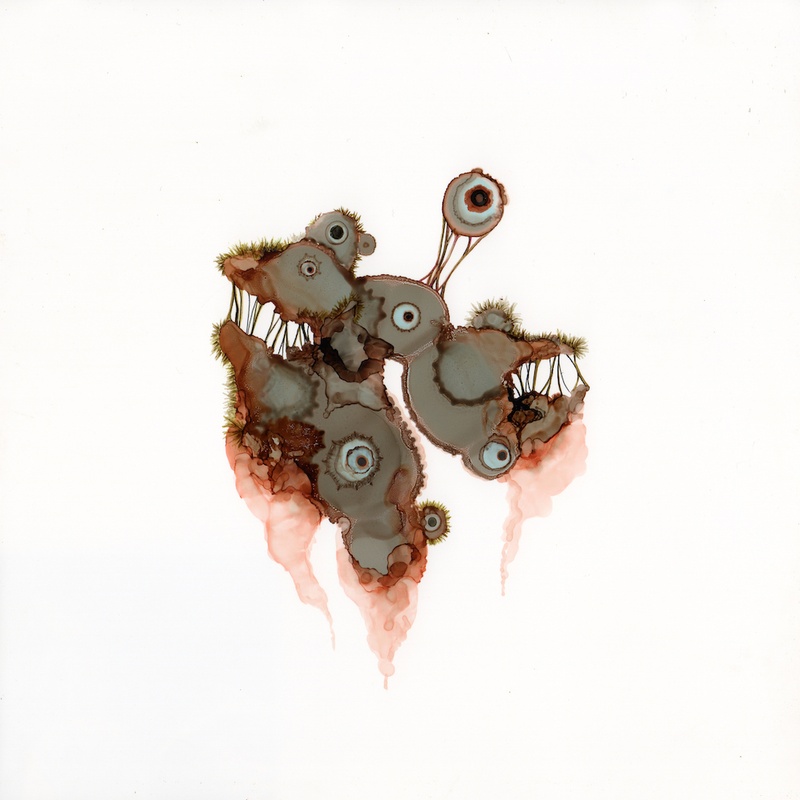
Best Friend
Were there ever projects that you did that you couldn’t complete or that you really struggled with?
I’m really good at abandoning stuff. Not people at all. I’m really bad at that, and I’m really bad at abandoning other people’s expectations. But if it was my own project that’s not working, it’s gone. I will get rid of it.
I do believe in revival though. I will say that. I think there’s a time and place for whatever reason, for certain things, and sometimes the idea is not right at the time. I guess I would say I’m really good at walking away from things that aren’t working, but I’m also not afraid to revisit them and that’s definitely happened quite a bit. There was a dog training and behavior project I was building with my friend and we and it didn’t go anywhere and we dissolved it, but it was on the back burner for nearly a decade. Now it’s starting to revive again in a new way.
Instagram is so pervasive—have you found much traction as a visual artist online? You did this one [cosplay makeup] recreation of Pan which looked amazing.
I just binge watched Glow Up during COVID and thought, “Whatever. I can do that.” Most of it is done with Wet and Wild black eyeliner. I got some better paint at one point, but all the earlier stuff was just literally black and white eyeliner and a palette of eyeshadow. I have pretty minimal makeup. It’s so weird because people, when I first started doing it, were saying, “Oh my god. This is amazing.”
And I’m thinking, “Okay. This is almost on the verge of insulting. I’ve spent how many years in art school? I’ve been showing you my art for this many years.” People love the stuff. I will put my heart and soul into my artwork and you prepare for it, thinking, “I’m ready. I’m going to put it out there,” and it might not get much reaction. And as soon as you put something dumb out there, like, your new haircut, people are like, “Oh my god!”
I’ve come to the conclusion that people love things that are either super relatable or super unexpected, but there’s this chasm in between of things that qualify as, “I’ve seen that before from you. It doesn’t really impact me.” … You must have that too, people who don’t relate to your work when you’re making things that are abstract or things that aren’t just hyper palatable to the general public, it gets this very different response from your peers, which is why the creative community is so important because they’re the ones who are going to be like, “That’s sick, awesome job.”
Yeah. It’s been almost like a running trope in the lit community for a couple years I’ve seen going way back where it’s like, “I should just post poems on my selfies.” I’ve seen people say that a lot because they’re like, “It just doesn’t get the same attention.” It’s funny because I remember you saying when you did that makeup skull, you were just like, “I’m actually upset that people like this more than my real art.”
Yeah, I’m like, “Here’s a skull that I’ve painted within my artwork and it actually means something,” and people sort of shrug. But I saw a raccoon skull in the woods, took a picture of it and painted it on my face, but I put some eyelashes on, and oh my god. It broke the internet.
Kerry St. Laurent Recommends:
Boondocking
Hedonistic sustainability (see: Misadventure Vodka!)
New England Octobers
Celebrating platonic love
Fresh orange juice paired with salty, buttery popcorn
- Name
- Kerry St. Laurent
- Vocation
- Artist, educator
Some Things
Pagination
